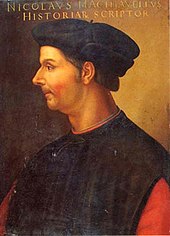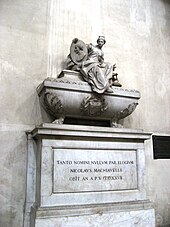History of Western Political Thought/Niccolò Machiavelli
Niccolò Machiavelli was an Italian diplomat, politician, historian, philosopher, humanist, and writer of the Renaissance period. He has often been called the father of modern political science. He was for many years a senior official in the Florentine Republic, with responsibilities in diplomatic and military affairs. He also wrote comedies, carnival songs, and poetry. His personal correspondence is renowned in the Italian language. He was secretary to the Second Chancery of the Republic of Florence from 1498 to 1512, when the Medici were out of power. He wrote his most renowned work The Prince in 1513.
Life
[edit | edit source]
Machiavelli was born in Florence, Italy, the third child and first son of attorney Bernardo di Niccolò Machiavelli and his wife, Bartolomea di Stefano Nelli.[1] The Machiavelli family is believed to be descended from the old marquesses of Tuscany and to have produced thirteen Florentine Gonfalonieres of Justice,[2] one of the offices of a group of nine citizens selected by drawing lots every two months and who formed the government, or Signoria; but he was never a full citizen of Florence because of the nature of Florentine citizenship in that time even under the republican regime. Machiavelli married Marietta Corsini in 1502.[3]
Machiavelli was born in a tumultuous era in which popes waged acquisitive wars against Italian city-states, and people and cities often fell from power as France, Spain, and the Holy Roman Empire battled for regional influence and control. Political-military alliances continually changed, featuring condottieri (mercenary leaders), who changed sides without warning, and the rise and fall of many short-lived governments.[4]
Machiavelli was taught grammar, rhetoric, and Latin. It is thought that he did not learn Greek even though Florence was at the time one of the centers of Greek scholarship in Europe. In 1494 Florence restored the republic, expelling the Medici family that had ruled Florence for some sixty years. Shortly after the execution of Savonarola, Machiavelli was appointed to an office of the second chancery, a medieval writing office that put Machiavelli in charge of the production of official Florentine government documents.[5] Shortly thereafter, he was also made the secretary of the Dieci di Libertà e Pace.
In the first decade of the sixteenth century, he carried out several diplomatic missions, most notably to the Papacy in Rome. Florence sent him to Pistoia to pacify the leaders of two opposing factions which had broken into riots in 1501 and 1502; when this failed, the leaders were banished from the city, a strategy which Machiavelli had favored from the outset.[6] From 1502 to 1503, he witnessed the brutal reality of the state-building methods of Cesare Borgia (1475–1507) and his father, Pope Alexander VI, who were then engaged in the process of trying to bring a large part of Central Italy under their possession.[7] The pretext of defending Church interests was used as a partial justification by the Borgias. Other excursions to the court of Louis XII and the Spanish court influenced his writings such as The Prince.
At the start of the 16th century, Machiavelli conceived of a militia for Florence, and he then began recruiting and creating it.[8] He distrusted mercenaries (a distrust that he explained in his official reports and then later in his theoretical works for their unpatriotic and uninvested nature in the war that makes their allegiance fickle and often unreliable when most needed),[9] and instead staffed his army with citizens, a policy that was to be repeatedly successful. By February of 1506 he was able to have marching on parade four hundred farmers, suited (including iron breastplates), and armed with lances and small fire arms.[10] Under his command, Florentine citizen-soldiers defeated Pisa in 1509.[11]

Machiavelli's success did not last. In August 1512 the Medici, backed by Pope Julius II, used Spanish troops to defeat the Florentines at Prato.[12] In the wake of the siege, Soderini resigned as Florentine head of state and left in exile. The experience would, like Machiavelli's time in foreign courts and with the Borgia, heavily influence his political writings. The Florentine city-state and the republic were dissolved, and Machiavelli was deprived of office and banished from the city for a year.[13] In 1513, the Medici accused him of conspiracy against them and had him imprisoned.[14] Despite being subjected to torture[13] ("with the rope", in which the prisoner is hanged from his bound wrists from the back, forcing the arms to bear the body's weight and dislocating the shoulders), he denied involvement and was released after three weeks.
Machiavelli then retired to his farm estate at Sant'Andrea in Percussina, near San Casciano in Val di Pesa, where he devoted himself to studying and writing his political treatises. He visited places in France, Germany, and Italy where he had represented the Florentine republic.[13] Despairing of the opportunity to remain directly involved in political matters, after a time, he began to participate in intellectual groups in Florence and wrote several plays that (unlike his works on political theory) were both popular and widely known in his lifetime. Politics remained his main passion and, to satisfy this interest, he maintained a well-known correspondence with more politically connected friends, attempting to become involved once again in political life.[15] In a letter to Francesco Vettori, he described his experience:
When evening comes, I go back home, and go to my study. On the threshold, I take off my work clothes, covered in mud and filth, and I put on the clothes an ambassador would wear. Decently dressed, I enter the ancient courts of rulers who have long since died. There, I am warmly welcomed, and I feed on the only food I find nourishing and was born to savour. I am not ashamed to talk to them and ask them to explain their actions and they, out of kindness, answer me. Four hours go by without my feeling any anxiety. I forget every worry. I am no longer afraid of poverty or frightened of death. I live entirely through them.[16]
Machiavelli died in 1527 at 58 after receiving his last rites.[17] He was buried at the Church of Santa Croce in Florence. An epitaph honouring him is inscribed on his monument. The Latin legend reads: TANTO NOMINI NULLUM PAR ELOGIUM ("So great a name (has) no adequate praise" or "No eulogy (would be) a match for such a great name").
The Prince
[edit | edit source]Discourses
[edit | edit source]Reference and further readings
[edit | edit source] Niccolò Machiavelli at Wikipedia.
Niccolò Machiavelli at Wikipedia.
- ↑ de Grazia (1989)
- ↑ Template:CathEncy
- ↑ Template:Harvcoltxt
- ↑ Maurizio Viroli, Niccolò's Smile: A Biography of Machiavelli (2000), ch 1
- ↑ Ridolfi, Roberto (17 June 2013). The Life of Niccolò Machiavelli. Routledge. p. 28. ISBN 9781135026615.
- ↑ Machiavelli 1981, notes.
- ↑ "Niccolo Machiavelli | Biography, Books, Philosophy, & Facts". Encyclopedia Britannica. Retrieved 28 July 2019.
- ↑ Viroli, Maurizio (9 January 2002). Niccolo's Smile: A Biography of Machiavelli. Macmillan. p. 81- 86. ISBN 9780374528003.
- ↑ This point is made especially in The Prince, Chap XII
- ↑ Viroli, Maurizio (9 January 2002). Niccolo's Smile: A Biography of Machiavelli. Macmillan. p. 81- 86. ISBN 9780374528003.
- ↑ Viroli, Maurizio (9 January 2002). Niccolo's Smile: A Biography of Machiavelli. Macmillan. p. 105. ISBN 9780374528003.
- ↑ Many historians have argued that this was due to Piero Soderini's unwillingness to compromise with the Medici, who were holding Prato under siege.
- ↑ a b c Machiavelli 1981, intro.
- ↑ Skinner, Quentin (12 October 2000). Machiavelli: A Very Short Introduction. OUP Oxford. p. 36. ISBN 9780191540349.
- ↑ Niccolò Machiavelli (1996), Machiavelli and his friends: Their personal correspondence, Northern Illinois University Press, translated and edited by James B. Atkinson and David Sices.
- ↑ Joshua Kaplan, "Political Theory: The Classic Texts and their Continuing Relevance," The Modern Scholar (14 lectures in the series; lecture #7 / disc 4), 2005.
- ↑ "Even such men as Malatesta and Machiavelli, after spending their lives in estrangement from the Church, sought on their death-beds her assistance and consolations. Both made good confessions and received the Holy Viaticum." – Ludwig von Pastor, History of the Popes, Vol. 5, p. 137.